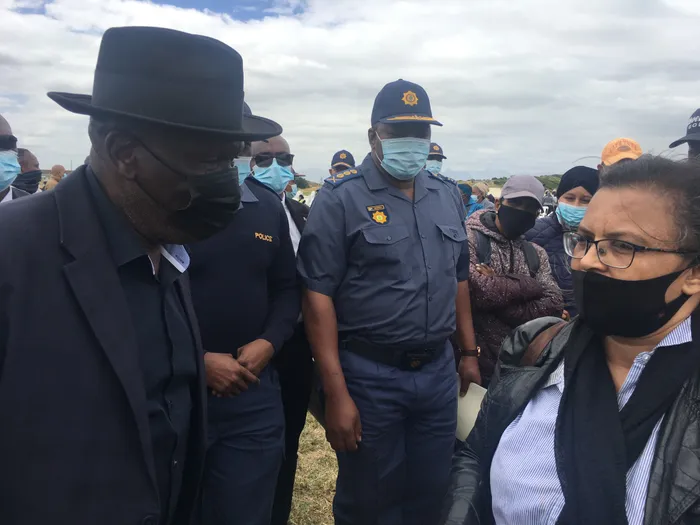’Plain pleads with police minister for more resources

Police Minister Bheki Cele speaks to Nazlie Dirks, from Tafelsig.
Mitchell’s Plain community workers’ calls for more police vehicles and support in the fight against crime and gender-based violence in the area, were overshadowed by the debate between the DA-led provincial government and Police Minister Bheki Cele about the distribution of police officers and resources across the country.
Mr Cele, flanked by Deputy Minister Cassel Mathale and SAPS provincial and national leadership officials, hosted an imbizo at the JP Rocklands Sports Ground, on Friday October 8.
Mr Cele responded by reading out national statistics and said that the Western Cape were among the provinces that received the bulk of police officers, from other provinces, and that had the services of dedicated units (See letter on page 2).

Vernon Fortune, the chairperson of the Hyde Park Tafelsig Neighbourhood Watch, said they have been waiting for 10 years for a police station.
He said Tafelsig residents had to spend up to R20 on taxi fare to and from Mitchell’s Plain police station to lay a charge yet they did not have food in their homes.
Mr Fortune commended Mitchell’s Plain police station commander, Brigadier Cass Goolam, for reducing crime in the area with limited police vehicles and resources.
“Mitchell’s Plain has so many people but we don’t have enough vehicles. There are three sector commanders using one vehicle,” he said.
He explained that each sector had to wait while crime was happening simultaneously in different sectors.
Mr Fortune said the provincial government has failed them as the neighbourhood watch and safety structure.
“Today we want to ask the national government how they can assist us so that we can be better and what can we do to partner with SAPS and our community,” he said.
Mr Bheki said he would take on the concerns of Nazlie Dirks, a Tafelsig mother, who said the justice system had failed her daughter twice.
Ms Dirks said her daughter was physically assaulted when she was 18 months old and again 13 years later.
She had escalated the matter to the police provincial ombudsman who sent her a letter a few months ago, saying that the initial case was not investigated.
She sent an email to the provincial commissioner’s office to follow up and was directed back to Mitchell’s Plain police station.
Ms Dirks said she escalated the matter because it seems the rights of adults trump those of children, even though it is said that the rights of children are being advocated for.
Ms Dirks said her daughter had been scarred psychologically, with anxiety and depression.
“We are living in such a cruel world and sadly we get treated like SAPS are doing us a favour,” she said.
Ms Dirks mentioned two other incidents of questionable police conduct and said the harsh reality is that if a police officer does not have a level of honour as well as respect for his station commander, “then we have a problem because that is where we get rotten apples.”
Norman Jantjes, the chairperson of the Mitchell’s Plain Community Police Forum (CPF), also raised the issue of the area being under-resourced.
“We need more vehicles. We need a gang unit because gangsterism is our biggest problem in Mitchell’s Plain. We also need a special focus on drugs because many of our murders are related to the supply of drugs,” he said.
He called on other departments who have a responsibility to the community to step up.
Mr Jantjes said the CPF and Mitchell’s Plain United Residents’ Association (MURA) submitted a memorandum highlighting the need for cameras and number plate detectors (“Call for an end to the violence”, Plainsman, March 17) to Community Safety MEC Albert Fritz and mayoral committee member for safety and security JP Smith but have not yet received responses.
He asked the CPF’s sub-forums, block committees and neighbourhood watches to work together.
“Think about what you are doing and how we can hold hands to make Mitchell’s Plain a safer area,” Mr Jantjes said.